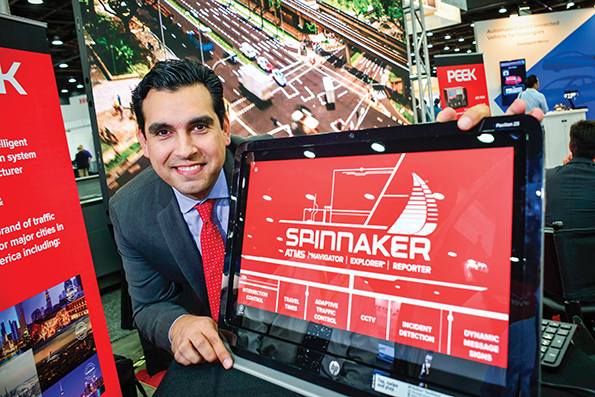Spanish company Applus IDIADA is showing the technology behind its Project VRAIN (Vehicular Risk Awareness Intelligent Network), which aims to improve safety for its clients in the automotive industry.

ITSWC 2014 Master Avatar
Spanish company 7863 Applus IDIADA is showing the technology behind its Project VRAIN (Vehicular Risk Awareness Intelligent Network), which aims to improve safety for its clients in the automotive industry.
The system, incorporating a radar and vehicle-to-vehicle (V2V) communications to enable vehicles to avoid collisions, is operational at the company’s south Barcelona high-speed proving ground. Several clients can be performing tests at the proving ground simultaneously, at speeds of up to 150mph /250km/h. To solve potential safety problems the installation of the VRAIN equipment makes use of GPS and V2V system to predict individual vehicles’ trajectories and possible impending collisions, allowing avoiding action to be taken.
Sub-lane GNSS accuracy is designed to minimise false warnings, as only vehicles in the same lane and below certain ‘time-to-collision’ thresholds will trigger alerts.
The system was developed initially to improve safety at Applus IDIADA’s own proving grounds, but also to refine it before it is released to the market.The company is hoping to have the system on the market from 2016, said Applus IDIADA’s ITS project manager, Alvaro Arrue.
The system, incorporating a radar and vehicle-to-vehicle (V2V) communications to enable vehicles to avoid collisions, is operational at the company’s south Barcelona high-speed proving ground. Several clients can be performing tests at the proving ground simultaneously, at speeds of up to 150mph /250km/h. To solve potential safety problems the installation of the VRAIN equipment makes use of GPS and V2V system to predict individual vehicles’ trajectories and possible impending collisions, allowing avoiding action to be taken.
Sub-lane GNSS accuracy is designed to minimise false warnings, as only vehicles in the same lane and below certain ‘time-to-collision’ thresholds will trigger alerts.
The system was developed initially to improve safety at Applus IDIADA’s own proving grounds, but also to refine it before it is released to the market.The company is hoping to have the system on the market from 2016, said Applus IDIADA’s ITS project manager, Alvaro Arrue.
The company is also showing progress on the i-GAME project, of which it is a member of the developing consortium, together with TuE and VIKTORIA. The aim of i-GAME is to speed up real-life implementation and interoperability of wireless communication-based automated driving.
Booth: 2407
%$Linker:










